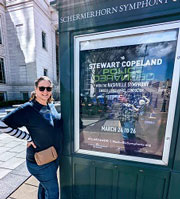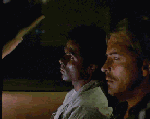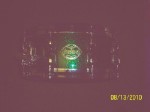http://www.freep.com/apps/pbcs.dll/arti ... 00387/1039
The Police put legacy on the line
Band hopes for rock magic in year of big reunions
January 30, 2007
BY BRIAN McCOLLUM
FREE PRESS POP MUSIC WRITER
There weren't a lot of these reunions left.
It's all but a done deal: an upcoming tour for venerated rock trio the Police, more than two decades after the band bowed out at the height of its fame. Buzz has been percolating for weeks, and things should start flying next month. Billboard magazine and other media have reported that the band is penciled in to play the Grammy Awards on Feb. 11, with an international tour announcement to follow.
If so, this is about as massive as it gets. The Police were the world's biggest band, selling out stadiums and dominating the global pop charts, upon their 1984 split. The trio's long refusal to bite the reunion bait has only made public appetite grow.
At first glance, the payoff seems great all around. Longtime fans get entertained again, young fans get their first glimpse, the band makes its cash, the tour industry gets a boost.
But just how wise is the act of the rock 'n' roll reunion? Old hands know it's fraught with a less visible peril: When you step back out to dust off your legacy, you risk getting it dirty in new ways. After years of letting things lie, that's apparently a chance the Police are willing to take.
One thing is certain: The band's reappearance means we're running out of untapped blockbuster comebacks.
Beyond Pink Floyd -- abandoned by Roger Waters in 1983 -- the Police were the most significant holdouts still prowling the hallowed halls of rock mythology. Or at least right near the top: Billboard reported last week that Van Halen -- with original vocalist David Lee Roth -- will also be heading out for a summer tour. Officials at Live Nation, Michigan's biggest concert promoter, would not comment on potential Detroit dates for the Police or Van Halen.
In the world of rock, 2007 is shaping up as Year of the Reunion. It's not just the quantity that stands out; remobilized old bands have dominated the summer concert circuit for years. It's the star power.
Beyond the Police and Van Halen, major reunion projects are on the way from such names as Rage Against the Machine, Genesis, Smashing Pumpkins and the Stooges.
The attendant hype for such comeback blitzes could be chalked up as another sign of contemporary rock's troubled times. Sure, a Police or Van Halen reunion would have been big news at any point the past two decades. But in 2007, their likely domination of the pop-music conversation will starkly reveal a modern scene that can't match such wide-scale excitement.
Rock reunions have become rollicking business. The 1990s were the decade that turned rock nostalgia into an industry, with hell-froze-over reunions of bands ranging from the Eagles to Kiss. Even the surviving Beatles got together to make music.
The summer season became the go-to stomping grounds for reconvened bands both major and medium, and VH1 joined the game with the popular "Bands Reunited," mustering the original lineups of new-wave hit makers like Berlin and A Flock of Seagulls.
In an age of entertainment-on-demand, summoning old favorites back into action has become just another public expectation.
"At the moment, we're looking at a very healthy year," says Gary Bongiovanni, editor of concert trade magazine Pollstar. "The fact that we'll have new things to sell -- even if they're old new things -- is nice."
Still, Bongiovanni says he won't make predictions about specific tours: "The public often looks at these reunion tours as a one-shot opportunity, and they'll pay a premium to see that. But anytime an artist disappears from the scene for a while, there's always a question. You never really know until you ask people to open their wallets."
The music annals are teeming, of course, with the magical reunions that can never happen in full: groups such as Led Zeppelin, the Allman Brothers and Nirvana, whose classic lineups have been splintered by death. That's what makes the Police a special case -- one of the few larger-than-life bands whose members aren't just alive and kicking, but remain creatively active.
There aren't a whole lot of candidates left. On the pop side are ABBA and the '60s-era Supremes. Alternative rock has the Smiths and the Talking Heads. In classic rock are the Kinks, maybe Journey with Steve Perry.
Recurring rumors of a Police reunion had become a standard feature in recent years, getting extra fuel when the trio temporarily re-formed for its 2003 induction into the Rock and Roll Hall of Fame.
For years we'd heard of the lingering animosity among Sting, Stewart Copeland and Andy Summers. The three had seemed intent on sticking to their guns, letting history be history after the breakup that made the Police one of those pop-culture rarities: an act that went out on top.
And that gets right to that dim danger lurking at the core of the rock reunion: screwing up the legacy. The trio's defiance in the face of what had surely been tremendous temptation -- financial and otherwise -- is one reason the band's credibility held up strong over time. Hitting the road means taking that reputation out for a spin, too.
Bret Burnette, 29, is OK with that risk. An avid Police fan from Flint, he's never seen the band. But he's devoured the concert videos.
"It won't be like it was when they were younger. Maybe the energy level won't be as high," says Burnette. "But to see all those classics played live is pretty awesome. The idea of them getting back together -- I'm waiting for the day tickets go on sale."
The Police put legacy on the line
9 posts
• Page 1 of 1
This is what kills me about journalism (or whatever you want to call it). They have nothing really worthwhile to talk about, so they have to analyze things to death.
In the big scheme of things, when we are all ancient history, is it really going to matter that this rock band decided to reunite? Should they really be worried about their "legacy"? I mean come on. It's music, and it's going to be celebrated by millions of people worldwide. How can that be a bad thing?
In the big scheme of things, when we are all ancient history, is it really going to matter that this rock band decided to reunite? Should they really be worried about their "legacy"? I mean come on. It's music, and it's going to be celebrated by millions of people worldwide. How can that be a bad thing?
~none of my pleasures are guilty~ me
-

bella - Posts: 2179
- Joined: 06 Jul 2005 14:48
- Location: Virginia is for Lovers
[quote="zilboy"]Strange how the article does not mention the reason that the reunion is taking place. The cynical tone seems to lump the Police in with bands who reunite for the sole purpose of making some quick cash.[/quote]
Agreed, though I agree with everything the guy says. What is next?
The Beatles w/ Paul, Ringo, Julian, and Dhani?
Agreed, though I agree with everything the guy says. What is next?
The Beatles w/ Paul, Ringo, Julian, and Dhani?
-

blueseattle - Posts: 459
- Joined: 05 Jan 2007 04:32
- Location: Miami, FL
"It won't be like it was when they were younger. Maybe the energy level won't be as high," says Burnette. "But to see all those classics played live is pretty awesome. The idea of them getting back together -- I'm waiting for the day tickets go on sale."
That was worth saying again.
That was worth saying again.
"Sting was a (expletive) before, and he really is now."- SC
-

Grant - Posts: 183
- Joined: 22 Jul 2005 20:12
- Location: Denver, CO
I thought that this article had a bit of negative tone at first, but I don't think it was intended that way. It's just meant to fill up some space and get people like us to come to their website because we need something to think about while we're waiting for it to actually happen. I guess it worked...
As far as the Police legacy goes, I don't think there is too much to worry about. Somehow I think The Police could come out and do just about anything, and people would still love it. At this point, it is more about celebrating the band and putting some closure on their legacy. It's not like they are trying to make a comeback as an active band, and people are going to see if they still "have what it takes".
I'm just glad this is finally happening, and that it is still able to happen as all the members are still around and still making music.
Yes there will probably be attendance records set and the amount of money generated by all of this will be staggering (which will probably make Sting's ego happy), but I truly think that the main impetus behind this reunion tour is to give the fans the closure they have craved for over twenty years. Stewart has mentioned many times that he would do it for free, which probably didn't help him during profit splitting negotiations with Sting , and Andy probably feels the same way as I think they both understand the "fans" point of view.
, and Andy probably feels the same way as I think they both understand the "fans" point of view.
As far as Sting finally agreeing to it....maybe he felt he had accomplished everything he needed to as a solo artist....maybe he finally wants to stop being asked 10 times a day when they Police are getting back together....
....or maybe he is once again contradicting himself, and really is deep down a sentimental person.
As far as the Police legacy goes, I don't think there is too much to worry about. Somehow I think The Police could come out and do just about anything, and people would still love it. At this point, it is more about celebrating the band and putting some closure on their legacy. It's not like they are trying to make a comeback as an active band, and people are going to see if they still "have what it takes".
I'm just glad this is finally happening, and that it is still able to happen as all the members are still around and still making music.
Yes there will probably be attendance records set and the amount of money generated by all of this will be staggering (which will probably make Sting's ego happy), but I truly think that the main impetus behind this reunion tour is to give the fans the closure they have craved for over twenty years. Stewart has mentioned many times that he would do it for free, which probably didn't help him during profit splitting negotiations with Sting
As far as Sting finally agreeing to it....maybe he felt he had accomplished everything he needed to as a solo artist....maybe he finally wants to stop being asked 10 times a day when they Police are getting back together....
....or maybe he is once again contradicting himself, and really is deep down a sentimental person.
-

blueboy - Posts: 243
- Joined: 22 Dec 2005 21:30
- Location: Vancouver
Ruining their legacy. Absolute bollocks. Sting don't need the £$ and he's had more success solo anyway. He's doing it for his mates Andy and Stewart plus us, the fans. I will go see The Police wherever in a heartbeat, whereas when my other favourite band played my hometown I couldn't be arsed.
Queen actually are ruining their legacy. When only half your original line up are playing arenas not stadiums and including covers in their set - despite having over a dozen albums' worth of material to choose from - that's when you ruin a legacy in my book. Oh and having to rework hits with the likes of Wycleff and 5ive too.
I just see this as the farewll we never had and for that we gotta be well grateful I reckon.
My 2p
G~
Queen actually are ruining their legacy. When only half your original line up are playing arenas not stadiums and including covers in their set - despite having over a dozen albums' worth of material to choose from - that's when you ruin a legacy in my book. Oh and having to rework hits with the likes of Wycleff and 5ive too.
I just see this as the farewll we never had and for that we gotta be well grateful I reckon.
My 2p
G~
-

gezellig - Posts: 39
- Joined: 07 Jan 2007 14:10
Amen to everything said thus far. The Police have nothing to prove to anyone and the very fact that they have all been so successful individually only strengthens their "legacy."
However, I'm not so sure that this should be viewed as the epilogue. I think that once the lads hit the stage, there could be enough ink for one more chapter(?)
However, I'm not so sure that this should be viewed as the epilogue. I think that once the lads hit the stage, there could be enough ink for one more chapter(?)
-

zilboy - Posts: 1030
- Joined: 07 Jan 2006 18:42
I agree that the band could do whatever they want, and still maintain their legacy. I think even if they "put on skirts and sang songs about beer", as Sting once said, they would still be recognized as a powerful force in music...whatever the current trend may be. Having said that, they should be careful of what they undertake. A few appearances, a box set, maybe some DVD's...that would be great. A full-scale tour may indeed be viewed by some to be a money-grabbing venture, which of course all of us Police fans know would never be the band's intention. I'm sure whatever they do, they will do it with class.
-

Howstupidmrbates - Posts: 629
- Joined: 21 Jun 2005 15:48
- Location: Redlands, CA
9 posts
• Page 1 of 1
Who is online
Users browsing this forum: No registered users and 60 guests